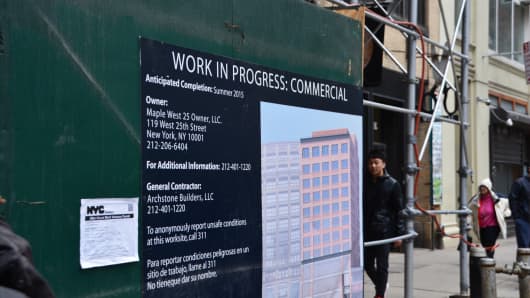It’s hard to tell which is more powerful — the beat from 8 a.m. high-intensity circuit training class at the Fhitting Room on Manhattan’s West 19th Street, or the pounding of the sledgehammers six blocks north in what will be the new penthouse corporate headquarters of Peloton, a live-streaming, indoor cycling start-up.
Whichever the decibel winner between these competitors, this kind of boutique fitness is winning the workout wars in Manhattan and across the nation.
“I call it the intersection between personal training and group fitness,” said Kari Saitowitz, founder of the Fhitting Room, which bills itself as an upscale High Intensity Training (HIT) boutique fitness studio.
The classes are smaller, the attention closer and the amenities higher end. Individual shower rooms with designer soaps and lotions, and special stations for hair and make-up. All that, of course, comes at a price. A single class costs $38. Compare that to fees that can go as low as $10 for a full monthly membership at a chain-style gym, like Planet Fitness, which went public last year.
The Fhitting Room started its first studio uptown in early 2013 but recently opened its flagship studio on West 19th Street in Manhattan’s Flatiron district, where you can’t throw a kettle bell these days without hitting something related to fitness, be it food, apparel or studio.
“It’s become the fitness district,” said Saitowitz, a petite powerhouse in the business, clad in stretch pants and combat boots. “When we’re all located near each other, everybody’s clients get introduced to everybody else’s concept. We’ve partnered with other studios before to do fitness crawls, and I think it’s more exciting for the client to mix it up.”
With office buildings all around, many of them harboring health-conscious, young tech companies, the three-martini lunch has turned into a 50-minute workout with clients and a juice. Some companies subsidize classes, which only adds to their accessibility. Whether it’s HIT studios, Yoga, Pilates, underwater cycling, boxing or Barre, if it is “boutique” it is big business.
The Fhitting Room offers lunchtime classes, but otherwise the workouts are before and after work hours. Another Upper East Side location caters more to nonworking clients.
“I work in media. I bring a bunch of clients here, come with friends from work, and we make it a weekly thing if not more than once a week,” said 20-something Melanie Estrin, her hair still wet from the shower as she headed to work after a 7:30 a.m. class.
Of the 54.1 million Americans estimated to have fitness memberships last year, 42 percent said they go to boutique studios; that’s up from 22 percent barely three years ago, according to a report released in October by industry trade group International Health, Racquet & Sports Association. Health club industry revenue overall increased 9 percent from $22.4 billion in 2013 to $24.4 billion in 2015. In Manhattan alone, boutique studios are multiplying monthly.
“We’ve seen over the last six months, as we’ve been under hard construction in this building, we’ve probably seen six or seven different fitness, health and wellness or fitness related tenants come through, either for office space or for the first and second floor retail space for actual fitness use,” said Paul Teti of Normandy Real Estate Partners, the developer of a building on West 25th Street that will house Peloton’s new corporate headquarters.
“What we are seeing is fitness as a theme, for almost every user, so whether it’s a boutique fitness story like Barry’s Boot Camp of the world or Peloton, which literally is coming to your living room, it’s part of what these users want to talk about,” said Teti.
Peloton, which CEO John Foley prefers to call a media company rather than a boutique fitness studio, will take the top four floors of the building. It is pouring $7 million into renovations, hoping to lure top, young techies from around the nation.
“We are trying to recruit all the best software engineers from Googleand Facebook and Tumblr, and in order to recruit the best software engineers, you have to have a grand dramatic headquarters that is better than anybody else,” said Foley, who gave us a tour through the site. “They need to be able to look uptown at the Empire State Building when they are having lunch, on the south side they need to be able to look over at [One] World Trade Center… stand up shuffleboard, pingpong, foosball, beer kegs, whiskey kegs, coffee kegs.”
Peloton’s actual studio is two blocks south, where indoor cycling meets on-demand fitness. The classes stream live daily to more than 30,000 users, who have purchased the Peloton cycle for home use.
“We stream 12 hours of live content television around the world every day, so this headquarters is part of our story of being one of the special technology companies that is going to be defining the future of our category,” Foley said.
Just as location defines the fitness companies, the companies are defining locations around the country. In major cities like Washington, D.C., Philadelphia, and in California, the boutique studios are generally popping up where millennials are and, again, feeding off each other.
Some are now questioning whether big name studios like SoulCycle and Barry’s Boot Camp, which have locations in several states, can be considered “boutique.” Clearly it is a coveted label.
Correction: This story was updated to correct that Peloton says it streams to 30,000 users.
[“source-Cnbc”]















